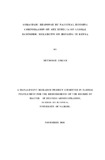| dc.description.abstract | Housing is one of the social pillars since time immemorial as different communities around the world in their pursuit to reserve their cultural values built shelter which ranged basic shanties to high-end massionattes appealing to every communities taste and preferences. As time went by and the need for decent housing given the effects of civilization grew, many countries came up with policies geared towards achieving this order for their citizenry to live better than yesteryears. These policies formed some of the general strategies on how governments with the help of UN Habitant to tackle the ever increasing demand of houses for the rising population.
In the USA the mortgage loan facilities was one of the major moves that was trying to address this housing issue. However this backfired in the bubble bust causing the unprecedented ripple effects of the economic meltdown in the late 2008. Project The research thus wanted to find out how the Global Economic Meltdown experienced in the last quarter of 2008 affected the provision of affordable housing in Kenya by carrying out a study on the strategic responses by NHC to the challenges.
The specific objectives of the study were to determine the critical challenges facing general housing in Kenya, to evaluate the mitigation strategies employed by National Housing Corporation to safeguard against future global meltdown and to draw recommendations on the post crisis outlook and the way forward in the housing industry. Major focus on literature review was on the developments in the housing and construction sector and the contributions by bodies, individual comments on the state of housing in Kenya and the Government and UN Habitant role in improving the quality of housing in general terms.
The research project collected primary and secondary data from NHC which mandated to promote low-cost houses, stimulate the building industry and encourage and assist housing research. Interviews were conducted with senior managers of both NHC and KCB S&L Mortgage and data analyzed using quantitative and qualitative approaches. The findings of the research indicated that the economic meltdown had devastating effects on the provision of affordable and decent housing and general performance of the economy in Kenya. The major economic challenges facing NHC were identified and the strategic responses NHC employed to minimize the effects of the economic crisis.
The research concluded that critical challenges facing general housing in Kenya are multidisciplinary and cannot only be pegged on the economic meltdown experienced after the housing bubble bust in the USA in the late 2008. The recommendations of the research point towards the mitigating factors of the risks brought by the economic disaster and how organizations should do in order to effectively safeguard the interests of their shareholders and those of customers in order to survive the dynamic nature of business environment. | en_US |

